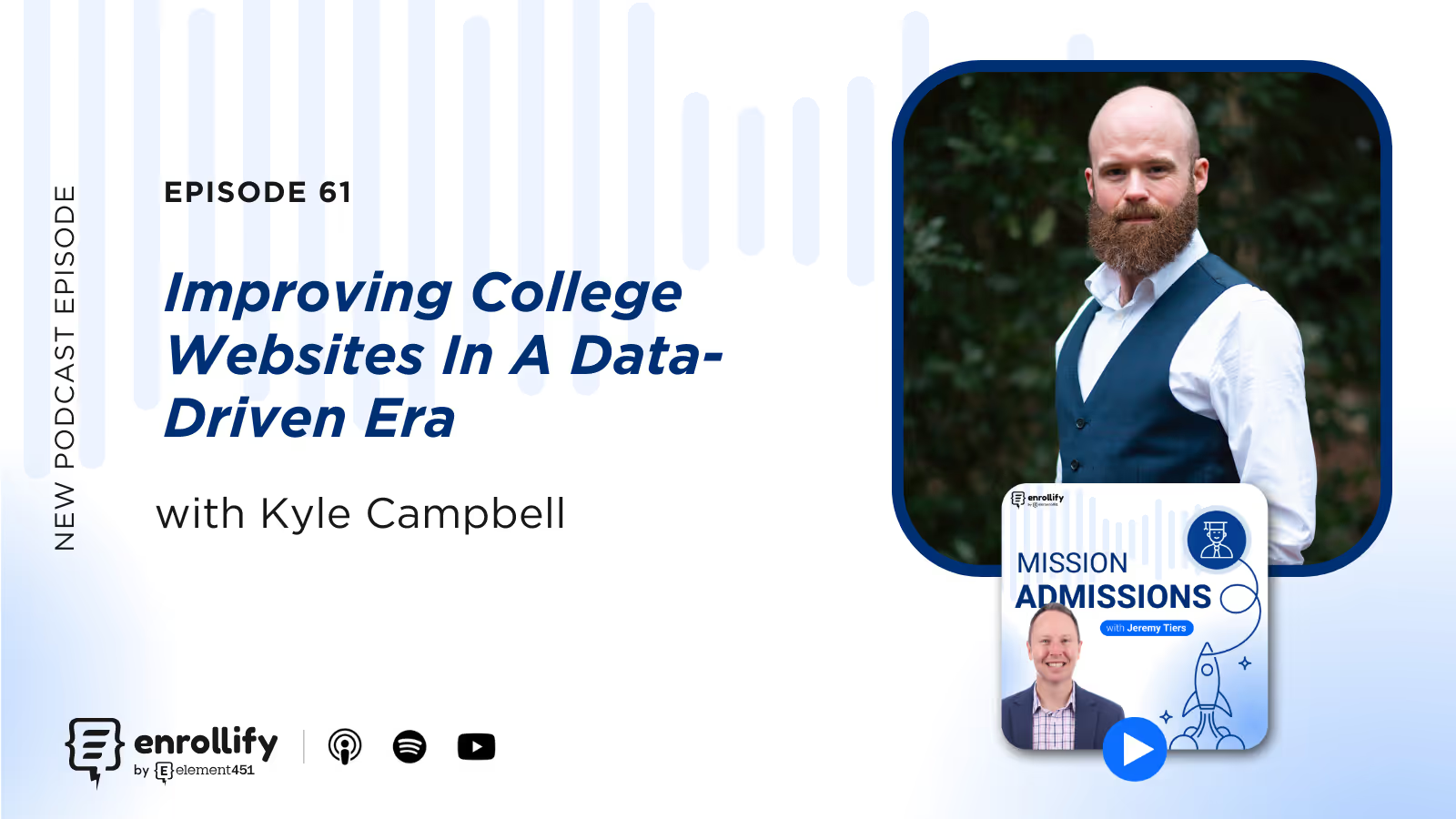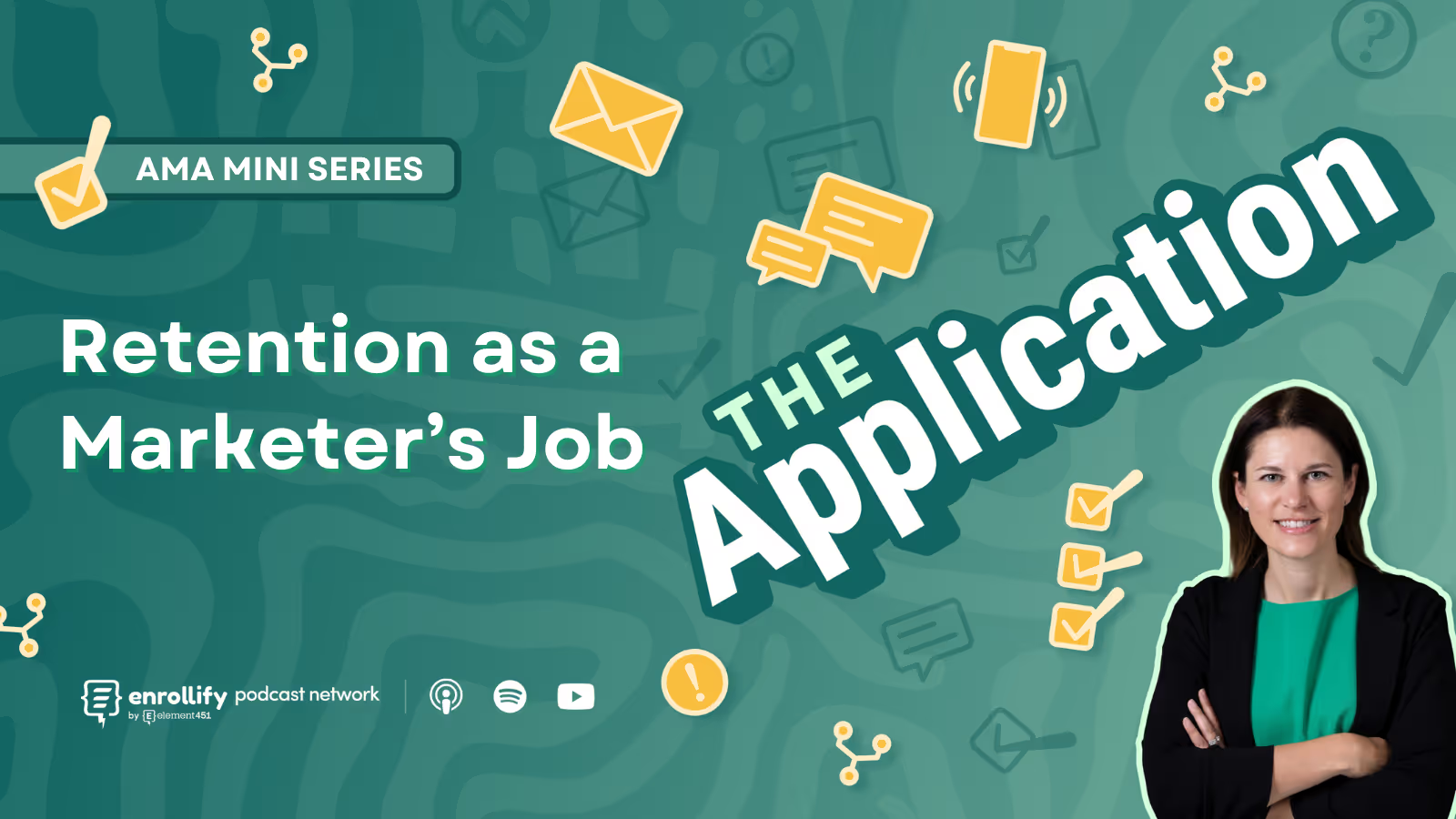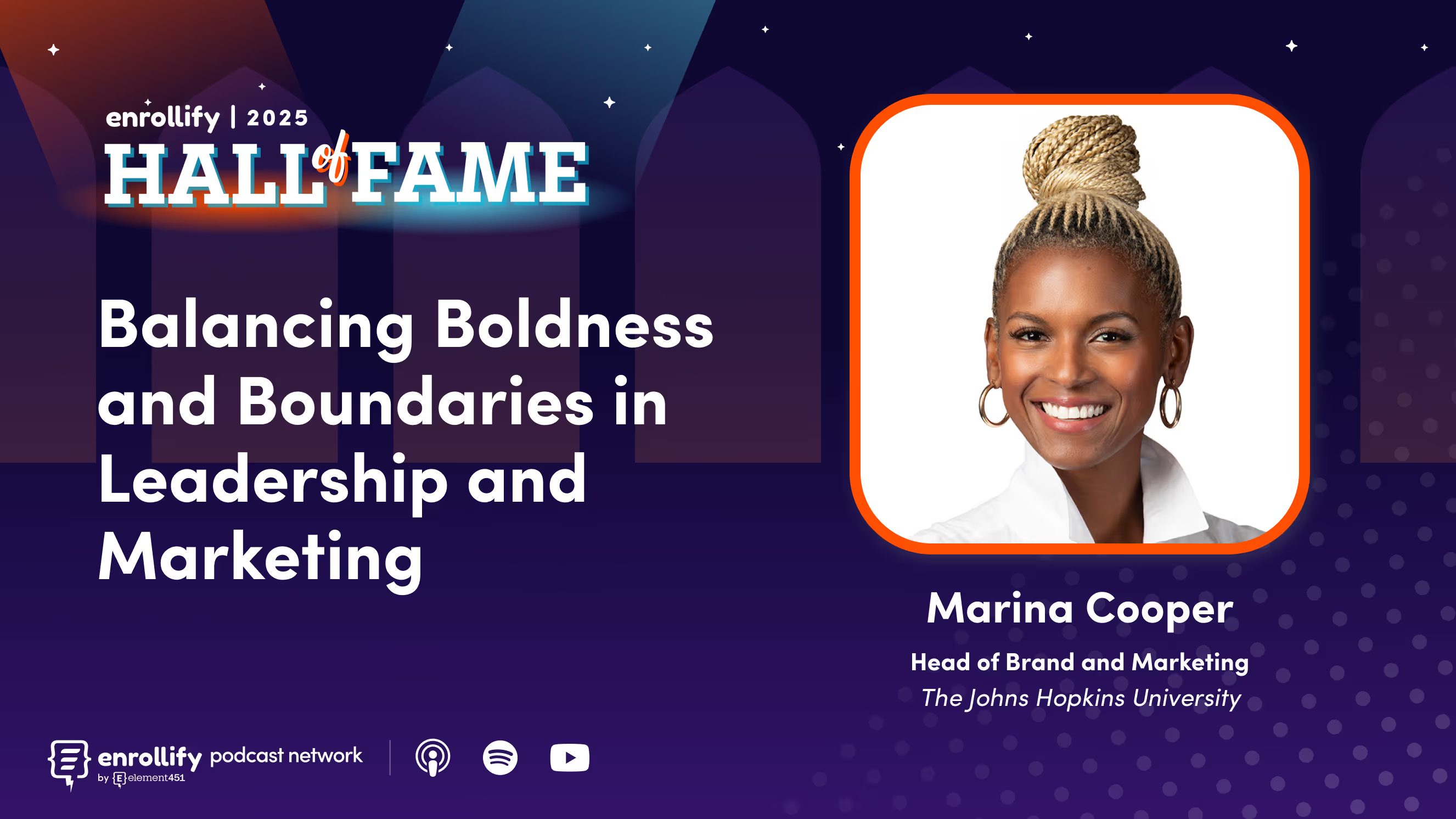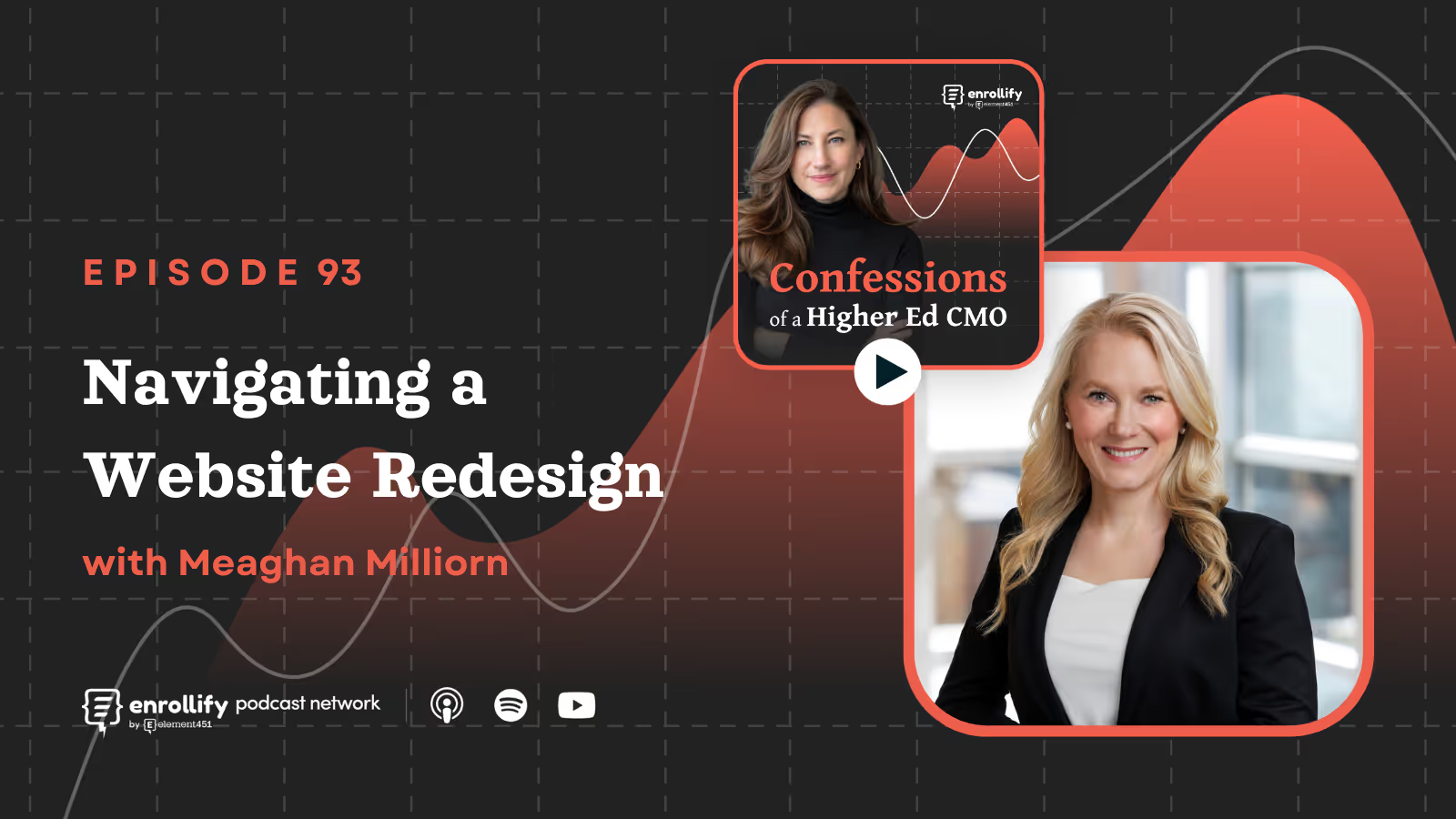About the Episode
Got a story to tell? An innovative idea to share? Fill out our guest nomination form and let's chat!
About the Episode:
Jeremy Tiers sits down with Kyle Campbell, a higher ed marketing expert and sought-after speaker, to discuss the evolving role of college websites. Kyle shares insights into why traditional university websites are failing to engage Gen Z, the biggest mistakes institutions make with their content, and how colleges can reimagine their digital presence to drive conversions. If you're looking for actionable strategies to optimize your school's website and enrollment marketing strategy, this episode is packed with expert advice.
Key Takeaways
- The role of college websites is shifting – While they were once primarily for conversion, they must now focus on inspiration and student engagement.
- Social media is losing trust – Institutions have relied on social for storytelling, but with declining engagement, it's time to bring aspirational content back to the website.
- Landing pages matter most – Students often bypass homepages and go straight to program or course pages, so these need to be optimized for engagement.
- Authenticity drives conversions – Prospective students value honest reviews, real student stories, and transparent information over polished marketing language.
- AI will reshape search and content strategies – As AI tools become more dominant, universities need to ensure their website content is discoverable by AI-driven search.
- Websites should prioritize student pain points – Institutions should create content that helps prospective students navigate financial aid, career decisions, and the transition to college.
How Should College Websites Function in 2025?
The primary role of a college website has traditionally been conversion—guiding prospective students to apply or request more information. However, as Kyle Campbell points out, this approach is becoming outdated. With trust in social media platforms declining and students seeking more meaningful engagement, institutions must rethink how they use their websites.
A university’s website should serve as a trusted hub that reflects student aspirations and interests. Instead of being overloaded with jargon and dense text, it should be visually engaging, easy to navigate, and focused on answering the real questions students have. Universities have outsourced too much storytelling to social media, and now, with platforms like Twitter and Meta evolving unpredictably, it's time to bring compelling, student-centered content back to the website.
Where Can Colleges Improve Their Website Content Strategy?
Most universities focus heavily on homepage design, but students often skip it entirely. Instead, they land directly on program pages, yet these pages are often the least engaging. Kyle suggests taking cues from social media and integrating more dynamic, multimedia content into key landing pages.
Rather than just listing academic requirements and career outcomes, these pages should include:
- Short, engaging videos featuring student experiences and faculty insights.
- Genuine student conversations—not scripted testimonials, but real, unfiltered feedback.
- Personalized content recommendations, guiding students based on their interests.
By making program pages feel like curated experiences instead of static brochures, colleges can better capture and hold student attention.
How Can Schools Gather Better Student Insights?
One of the biggest challenges in higher ed marketing is the disconnect between what institutions think students want and what students actually need. According to Kyle, colleges often rely on large-scale surveys but miss out on deeper, qualitative insights.
A simple fix? Regular one-on-one conversations with students. If every marketing team scheduled just 10-15 student interviews per quarter, they could uncover recurring themes and pain points. These insights could then inform website updates, content strategy, and messaging—ensuring the digital experience aligns with student expectations.
Another overlooked tactic is leveraging self-reported attribution. Asking students how they found the university, through simple form fields or AI-driven analysis, can provide valuable insights into what marketing channels and website pages are working best.
The Role of AI in Higher Ed Websites
AI is already reshaping how students search for colleges. As Google and other search engines shift toward AI-generated answers, universities must ensure their content remains visible.
Kyle predicts that websites will continue to be a primary trust source, but they must adapt:
- AI chatbots and tools should be trained with high-quality university content.
- Websites must feature clear, structured information that AI can pull into search results.
- Institutions should rethink traditional web analytics, as organic traffic may decline while AI-driven discovery increases.
Rather than focusing only on website visits, universities should prioritize conversion and engagement—tracking how students move from AI-generated search results to inquiries and applications.
How Can Colleges Use Social Media and Websites Together?
Social media still has a role to play, but it should serve as a driver, not the main content hub. Instead of treating web and social as separate entities, institutions should build a content repurposing engine:
- Create in-depth content on the website (e.g., a financial aid explainer or career planning guide).
- Use social media to promote snippets of that content (e.g., short video clips or infographics).
- Drive traffic back to the website, where students can engage in a deeper experience.
This ensures that critical student information is centralized in a controlled, trusted environment rather than fragmented across various social platforms.
What’s the Future of College Websites?
The traditional higher ed marketing model—static web pages and siloed social media efforts—is no longer enough. The next generation of college websites must be:
- Dynamic – Featuring multimedia, interactive tools, and student-driven content.
- Searchable – Optimized for AI discovery and structured for easy navigation.
- Authentic – Showcasing real student experiences and transparent insights.
- Personalized – Offering tailored content recommendations based on user behavior.
Institutions that embrace these changes will stand out in an increasingly competitive enrollment landscape. Those that don’t risk getting lost in the noise.
Connect With Our Host:
Jeremy Tiers
https://twitter.com/CoachTiers
Attend the 2025 Engage Summit!
The Engage Summit is the premier conference for forward-thinking leaders and practitioners dedicated to exploring the transformative power of AI in education.
Explore the strategies and tools to step into the next generation of student engagement, supercharged by AI. You'll leave ready to deliver the most personalized digital engagement experience every step of the way.
👉🏻 Register now to secure your spot in Charlotte, NC, on June 24-25, 2025!















